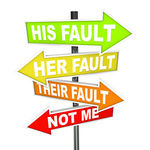Why You Should Stop Blaming Your Ex
Heaping all or most of the blame for your failed marriage onto your ex-spouse is tempting and quite common, but it really doesn’t help. In fact, it can hurt you in the long run (more on this in my next post!)
Here are 6 Steps To Help You Stop Playing The Blame Game:
1.Acknowledge Your Angry Feelings.
Some of us don’t feel comfortable with being angry. ..we may even have been taught that we shouldn’t be angry–because it wasn’t kind, or nice or lady-like. In truth, it is not only ok to feel angry (about the demise of your marriage, your job loss, the lousy weather, whatever!). In fact, it is necessary for you to feel anger as it is one of several stages (of grieving and loss) you need to experience to get beyond your divorce and move ahead. Also, we humans experience anger for a reason. It helps to view your feelings of anger as your own internal alarm system going off to tell you something is not right in your life and you need to pay attention and take care of yourself.
2. Observe Your Anger.
What are you getting ‘stuck’ on? Do you have reoccurring thoughts where you focus on the same message, scene, or conversation over and over again (until you are steaming mad) or is it more of an overall feeling of frustration or helplessness that you are experiencing? Try to distinguish between blaming anger (“he shouldn’t have done this to me”) vs. outrage or indignation (some injustice has occurred and demands attention). Keep in mind that ruminating over past hurts keeps us locked into the past rather than poised for a better future.
3. Stop Yelling, Try Talking.
How are you handling your anger now and what are you doing about it? Are you talking with a therapist? A divorce coach? A dear friend, clergy or family member? Make it your business to talk— find someone you can talk with, regularly, about what is going on for you. This will help you learn more about what you are experiencing and about what to do about it. Perhaps you would also benefit from some active ‘coaching’ or ‘learning’ about how to best use your words to communicate how you are feeling and achieve your relationship goals. (Your therapist or a communications coach might be able to help you ‘get what you want with your words’ by refining and updating your communication techniques.)
4. Teach Those You Love.
The people we love are not mind readers, yet so often we wind up angry with them because they didn’t know the right thing to do or say at the perfect moment we needed them to do or say it. Well, how can they if we didn’t tell them? Consider it your job to educate others about what you like, need, and want and let them respond as they will. Many of us don’t ask for what we want and need as we are afraid others may disappoint us and we don’t like feeling disapp0inted…what a price to pay to avoid a feeling! NO ONE is a ‘mind-reader’, so we MUST tell what we want if we ever hope to get it!
5. Learn New Ways To Communicate.
If you find you are still deeply angry or seem to be stuck in blaming mode, you may be filled with unexpressed resentment based on the past. What will you do to prevent this from happening in the future? Learn to express yourself in a productive way, particularly when you are angry. What do you need to help you learn to speak your angry feelings in a way that others can hear you? How can you communicate anger or hurt productively (ie-”I get so upset when I feel forgotten by you” vs, “You treat me like a dog!”) so that others learn what works and what doesn’t work for you. Many of us grew up in “angry homes” where frustration and dissatisfaction were expressed with hurtful words or painful actions. As adults, we must learn how to express anger in a more helpful way, one that brings us closer to those we care about rather than by damaging our relationships.
6. Anger Is Energy—use it!
You can sit there silently and let anger boil and rage inside of you (and raise your blood pressure, stress your heart, and potentially eat away at your insides) or you can “discharge it” by expressing it and get it out of your system. Psychotherapists know that feelings can be discharged or released from your system through talking, of course, but there are other ways, too, to unburden and lighten your load. Here are a few to try: MOVEMENT: (sports are great–you can hit and kick balls, punch a bag, run until you drop, dance hard, swim, organize your house—whatever works for you). WORDS: Journal your angry feelings, write love or hate songs, essays, poems, letters…these can be your own private expressions of what you are feeling. CREATIVITY: Use clay, paint, wood, steel, whatever media you choose and express what you are feeling. You can also build something, sew, sculpt…whatever!
Blaming your ex is natural and is common when it comes to divorce. Continuing to blame and using it to hide behind or to keep yourself from growing, however, is not helpful and can interfere with moving forward toward a better life! These 6 strategies can help you stop blaming and start building a happier future for yourself and your family!



